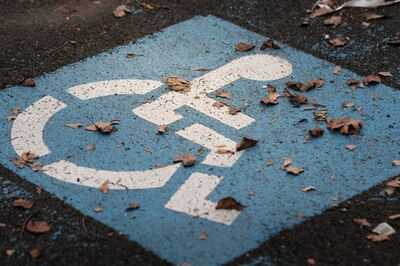People living with disabilities and health conditions who possess a Blue Badge could face a £1,000 fine for helping out their mates. Anyone given a Blue Badge must agree to adhere to various responsibilities when using it.
Government guidance states that misusing a Blue Badge and failing to uphold these responsibilities can result in a substantial fine, and confiscation of the badge itself. Indeed, Blue Badge misuse is deemed a criminal offenceand can therefore lead to a criminal record.
Consequently, it's crucial to remember thatthe Blue Badge may only be used by or for the benefit of the individual who originally applied for it. This means you cannot loan it to friends and relatives if you're not travelling as a passenger in the car, even if they're popping to the shops on your behalf or collecting something for you.
- Drivers face £1,000 fine this autumn if they don't remove one object from cars
- Using your car horn in one common situation could land you with £1,000 fine

Guidance on GOV.UK states: "It is a criminal offence for you or anyone else to misuse the badge. Doing so could lead to a £1,000 fine and confiscation of the badge. Making sure that the scheme is not abused will benefit genuine badge holders, such as yourself."
It continues: "You must never give the badge to friends or family to allow them to have the benefit of the parking concessions. You must never use a copied badge to park or try to change the details on a badge."
Who is automatically eligible for a Blue Badge?A Blue Badge can cost up to £10 in England and Northern Ireland, and £20 in Scotland, but it's free of charge in Wales. The responsibility of handling applications and setting the price falls on local authorities.
These permits typically have a validity of three years, after which the holder needs to reapply. There are two categories of individuals who can secure a Blue Badge - some qualify automatically, while others are assessed individually.
There are certain individuals who can automatically be granted a Blue Badge. This applies if you're aged three or above and meet at least one of the following criteria:
- You have received a lump sum benefit within tariff levels one to eight of the Armed Forces and Reserve Forces (Compensation) Scheme and have been certified as having a permanent and substantial disability that causes inability to walk or very considerable difficulty in walking
- You receive the mobility component of PIP and have obtained 10 points specifically for descriptor E under the ‘planning and following journeys’ activity, on the grounds that you are unable to undertake any journey because it would cause you overwhelming psychological distress
- You are registered blind (severely sight impaired)
- You receive a Personal Independence Payment (PIP) because you can’t walk more than 50 metres (a score of eight points or more under the ‘moving around’ activity of the mobility component)
- You receive a War Pensioners’ Mobility Supplement
- You receive the higher rate of the mobility component of the Disability Living Allowance (DLA)
If you've scored anything other than 10 points under descriptor E, in the 'planning and following journeys' activity of PIP, you might still be eligible for a Blue Badge. However, this doesn't mean you automatically qualify, even if your score is higher.
You'll need to provide evidence to prove your eligibility, which will be evaluated during your application process.
 Who can get a Blue Badge?
Who can get a Blue Badge? Not everyone automatically qualifies for a Blue Badge. Eligibility is assessed on an individual basis.
You may be eligible for a badge if one or more of the following apply:
- you have a severe disability in both arms and drive regularly, but cannot operate pay-and-display parking machines
- you are constantly a significant risk to yourself or others near vehicles, in traffic, or in car parks
- you find walking very difficult due to pain, breathlessness, or the time it takes
- you regularly have intense and overwhelming responses to situations, causing temporary loss of behavioural control
- you cannot walk at all
- you frequently become extremely anxious or fearful of public/open spaces
- you have a life limiting illness, which means you cannot walk or find walking very difficult and have a SR1 form
- you have a child under the age of three with a medical condition that means they always need to be accompanied by bulky medical equipment
- you struggle severely to plan or follow a journey
- you cannot walk without help from someone else or using mobility aids
- you find it difficult or impossible to control your actions and lack awareness of the impact you could have on others
- you have a child under the age of three with a medical condition that means they must always be kept near a vehicle in case they need emergency medical treatment
- walking is dangerous to your health and safety
In England, Scotland, and Wales, you can apply for a Blue Badge on GOV.UK. If you're in Northern Ireland, there's a different application process - further details here.
Your local council will determine if you're eligible for a badge. They can't start the assessment process until they have all the necessary evidence.
The assessment of your application could take 12 weeks or longer. If they decide that you're not eligible and you believe they didn't consider all the facts, you can ask them to reconsider your application.
You may also like

Jammu and Kashmir: Security forces conduct search operations in Rajouri, Udhampur to track terrorists

Bryan Mbeumo hands Ruben Amorim double boost ahead of Man Utd's clash with Liverpool

DMK will fight against SIR in TN, says Nehru

Cristiano Ronaldo becomes football's first billionaire, says report

SEZ units seek QCO relief, local sale flexibility







